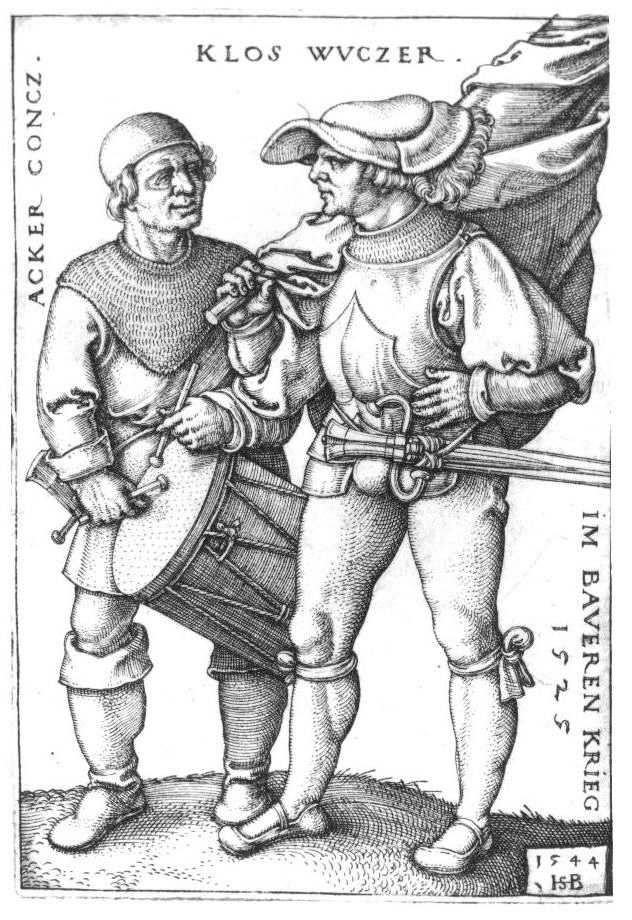 |
History 407/507
Peasants and Kings
in Early Modern Europe |
Course Outline
Week 1: Course Introduction
Week 2: Crises of the Later Middle
Ages
All: read for discussion in class: Rodney Hilton, Bond Men Made
Free, part I; document
analysis 1.
Graduate students: Peter Blickle, The Revolution of 1525,
part I.
Week 3: Martin Luther King Jr. Day -- no classes
Week 4: Social Movements of the Later
Middle Ages
All: read for discussion in class: Rodney Hilton, Bond Men Made
Free, part II; document
analysis 2.
Graduate students: Govind Sreenivasan, “The Social Origins of
the Peasants’ War in Upper Swabia,” Past and Present 171 (2001):
30-66; Paul Freedman, “The German and Catalan Peasant Revolts,” American
Historical Review 98 (1993): 39-55; Hans-Christoph Rublack, “The Song
of Contz Anahans,” in R. Po-Chia Hsia, ed., The German People and the
Reformation (Ithaca: Cornell University Press, 1988); John C. Stalnaker,
“Towards a Social Interpretation of the German Peasant War,” in Bob Scribner
and Gerhard Benecke, eds., The German Peasant War of 1525 -- New Viewpoints
(London:
Allen & Unwin, 1979), 23-38; Jürgen Bücking, “The Peasant
War in the Habsburg Lands as Social Systems-Conflict,” in
ibid.,
160-173.
Week 5: A Revolution of the Common Man?
All: read for discussion in class: Peter Blickle, The Revolution
of 1525, part II; document
analysis 3.
Graduate students: Otto Brunner, Land and Herrschaft,
ch. 1; Howard Kaminsky, “The Noble Feud in the Later Middle Ages,” Past
and Present 177 (2003): 55-83; Gadi Algazi, “The Social Use of Private
War: Some Late Medieval Views Reviewed”, Tel Aviver Jahrbuch für
deutsche Geschichte: Zur Sozial- und Begriffsgeschichte des Mittelalters
27
(1993), 253-274; Winfried Schulze, in Kaspar von Greyerz, ed., Religion,
Politics, and Social Protest: Three Studies on Early Modern Germany (Boston:
Allen & Unwin, 1984).
Week 6: Representing Peasants
Undergraduate students: no meeting; present draft prospecti
due at individual conferences.
Graduate students: Keith Moxey, Peasants, Warriors
and Wives: Popular Imagery in the Reformation, chapters 2-4 and Stephen
Greenblatt, “Murdering Peasants: Status, Genre, and the Representation
of Rebellion,”
Representations 1 (1983): 1-29.
Week 7: The Rebel Imagination
Undergraduate students: Yves-Marie Bercé, History
of Peasant Revolts, chapters 3-5.
Graduate students: David M. Luebke, His Majesty's Rebels:
Communities, Factions, and Rural Revolt in the Black Forest, 1725-1745
(Ithaca: Cornell University Press, 1997); Hermann Rebel, “What Do the Peasants
Want Now? Realists and Fundamentalists in Swiss and South German Rural
Politics,” Central European History 34 (2001): 313-356; David M.
Luebke, “Symbols, Serfdom, and Peasant Fractions: A Response to Hermann
Rebel,”
ibid., 357-382; Andreas Suter, “Theories and Methods for
a Social History of Historical Events: Reply to Hermann Rebel,” ibid.,
383-418.
Week 8: Rebellion and Gender
All: read for discussion in class: Peter Sahlins, Forest Rites:
The War of the Demoiselles in Nineteenth-Century France (all).
Graduate students: Cynthia A. Bouton, “Gendered Behavior in
Subsistence Riots: The French Flour War of 1775,” Journal of Social
History 23 (1990): 735-754 and John Bohstedt, “Gender, Household and
Community Politics: Women in English Riots, 1790-1810,” Past and Present
120 (1988): 88-122.
Week 9: Petitions, the Public Sphere,
and Revolution
Undergraduate students: no meeting; use the time for research
and writing.
Graduate students: read for discussion in class:
1) David Zaret, “Petitions and the ‘Invention’ of Public Opinion in
the English Revolution,” American Journal of Sociology 101 (1996):
1497-1554.
2) Andreas Würgler, “Voices from Among the “Silent Masses”: Humble
Petitions and Social Conflicts in Early Modern Central Europe,” International
Review of Social History 46 (2001): 11-34.
3) Gilbert Shapiro and John Markoff, “Peasants Grievances and Peasant
Insurrection: France in 1789,” Journal of Modern History 62 (1990):
413-454.
Week 10: Research and Writing
Return
to the Peasants & Kings Homepage

